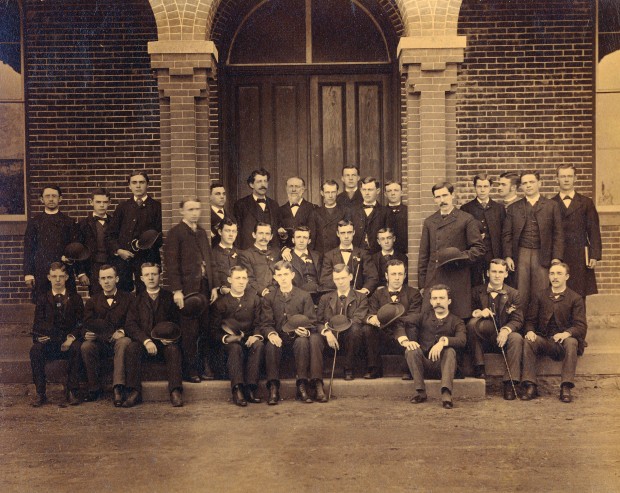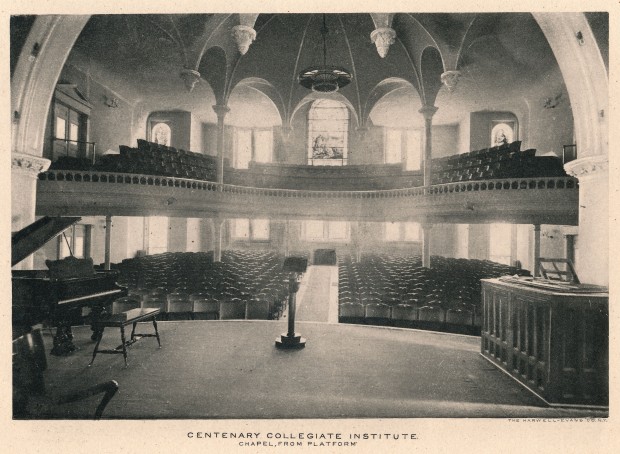“Enough cannot be said of Dr. Whitney’s president – his oft-expressed ‘Indomitable Will’ proved what he expected of his students in behavior, in studies, in strict observance of rules, and all that was uplifting. He was a grand man.”
Through Golden Years, p 198
When Dr. Whitney accepted the presidency of Centenary Collegiate Institute (C.C.I.) in August 1869, he ‘enter[ed] upon work which would appeal to his varied interests and call for all his abilities’ (9). Until the college opened in 1874, he worked as a Financial Agent for the Newark Conference, raising funds to build the institute (10). During the building’s construction, he was in high demand from other organizations: schools and universities invited him to be their president, and missions elected him to establish churches overseas. All these and more he declined in the interest of the fledgling institute (21). Even after C.C.I. opened, Dr. Whitney was pursued for other positions, but always turned them away. He felt that his attention should be solely focused on helping his new institute flourish. From 1869 until his death in 1913, Whitney committed himself fully to the success of Centenary.
“Education ought to do more for a man than to make him a mere encyclopedia”

President Whitney, top row, second from left at the 1898 C. C. I. reunion. This is four years after he retired from his presidency.
The first students at Centenary received a well-rounded education, focusing on academics, religion, and expression. Whitney resolved to set the highest standard possible for his students, and adopted the motto “all done, and all well done.” He remained at the school for the entirety of its first year even though he received many speaking invitations off campus. He also took on the task of teaching five classes daily, when he should have had no more than two (29). President Whitney established a lecture series to introduce new topics and different styles of presentation and created Friday afternoon exercises to give students a chance to improve their presentational skills through vocal and instrumental performances as well as public speaking drills. Students engaged in both practiced and impromptu speeches. Any opportunity to hone their rhetorical skills was greatly appreciated, and students who wanted even more practice organized Centenary’s first literary societies.
Centenary’s early years were filled with both anxieties and joys. Whitney said in his journals, “many times I wanted Job to come to teach me patience and courage…It had been a year of marvelous work and of great success and of great joy to us all…I learned much that [first] year! (50-1). He focused all his energy on the Institute year after year, but let his own health suffer. In 1889 his health was so poor that he ran the school confined to a chair until he could undergo surgery. His health somewhat renewed, Dr. Whitney returned to his presidency. By 1894 his pain was so intense that he was unable to attend to his duties. Delegating authority to others led to a drop in the college’s standing, and he made the difficult decision to resign.
After spending years recuperating, Dr. Whitney joined C.C.I. again as a Trustee where he did as much work as if he were President, being a lover in general of the great cause. After the fire that destroyed the old Main Building, he helped raise funds for a new institute, and furnished the largest room in that building – the chapel – himself. He also accepted an interim presidency in 1902 while the college was between presidents, and witnessed the graduation of the first class in the new building. In his journals he wrote, “It was a great honor! A great coincidence, strange indeed!” Dr. Whitney was Centenary’s most devoted advocate, and we are all indebted to him.
As Dr. Whitney would say, “All done, and all well done.”
Custard, Leila Roberta. Through Golden Years: 1867 – 1943. New York: Lewis Historical Publishing Company, 1947. Print.

